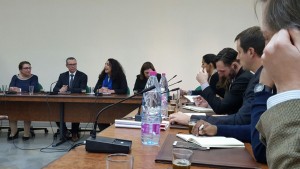Working Together to Promote Human Rights Locally, Regionally, and Globally: CIHRS and Human Rights INGOs discuss Tunisia’s role in the Human Rights Council with government officials
Press Release
On Thursday, December 1st, a delegation representing the Cairo Institute for Human Rights Studies (CIHRS) and a number of regional and international human rights organizations from Africa, Asia, Latin America, and the MENA region* met with Tunisian officials to discuss Tunisia’s role within the United Nations Human Rights Council. Representatives of the Tunisian government present at the meeting included the Tunisian Ministry of Foreign Affairs; the Minister of Relations with Constitutional Bodies, Civil Society and Human Rights; and members of the parliamentarian committees on rights and freedoms.
During the consultations, the delegation congratulated Tunisia on its recent election to the UN Human Rights Council, emphasizing its expectation that Tunisia would take a leading role in advancing human rights causes and supporting positive resolutions within the Council. The delegation encouraged Tunisia to reinforce the advancements it has already made in regards to upholding individual rights and the freedom of association, protecting human rights defenders, and combating violence against women.
During the meeting with the Human Rights Department at the Ministry of Foreign Affairs representatives of the NGOs encouraged Tunisia to consolidate an open policy towards civil society, based on regular consultations with national civil society organizations (CSOs). An open and constructive dialogue with CSOs would serve to strengthen and define Tunisia’s engagement with international human rights mechanisms.
Mr. Mehdi Ben Gharbia, Minister of Relations with Constitutional Bodies, Civil Society and Human Rights, reaffirmed Tunisia’s commitment to promoting an international framework that defends human rights. Mr. Ben Gharbia stated the ministry’s priorities, which include the harmonization of Tunisia’s legislative and institutional frameworks with its 2014 Constitution and international human rights standards. This includes ensuring the new law on freedom of association provides the maximum guarantees for civil society and strengthening the government’s partnership with CSOs, as well as combating discrimination and fostering a culture of human rights. The NGOs underlined the ministry’s role in ensuring that the defense of human rights on a global level remains the driving component of Tunisia’s policies within the Human Rights Council.
The delegation was received by members of the committee on rights and freedoms in Tunisia’s democratically elected parliament. The parliamentarians were congratulated on the progress that the parliament has made to strengthen human rights within the national legal framework. The delegation encouraged the parliament to proactively assure that Tunisia’s foreign policy supports struggles for freedom and democracy throughout the world as well as in the Arab region.
The delegation recommended that the parliament takes into consideration the human rights record of the candidates to the constitutional court as a criteria for their election. The parliamentarians acknowledged the persistent challenges that must be overcome to guarantee the constitutional court safeguards rights and freedoms, and they welcomed consultations with civil society as important partners in this process.
Tunis remains a unique example within the region that was successful in initiating a human rights based democratization process. CIHRS commends the Tunisian government’s openness to working alongside civil society organizations to ensure sustainable development in the country and to promote human rights locally, regionally, and internationally. CIHRS is dedicated to working with the Tunisian government, both in the capital and in Geneva, to enable Tunisia to externalize its democratic experience within the Human Rights Council in the upcoming years.
*The delegation consists of: The Cairo Institute for Human Rights Studies, Human Rights Watch, Forum Asia, Open Society Foundations, East and Horn of Africa Human Rights Defenders Project, the International Service for Human Rights, Asian Forum for Human Rights & Development, Conectas Human Rights (Brazil), The Center for Legal and Social Studies (Argentina)
Share this Post

